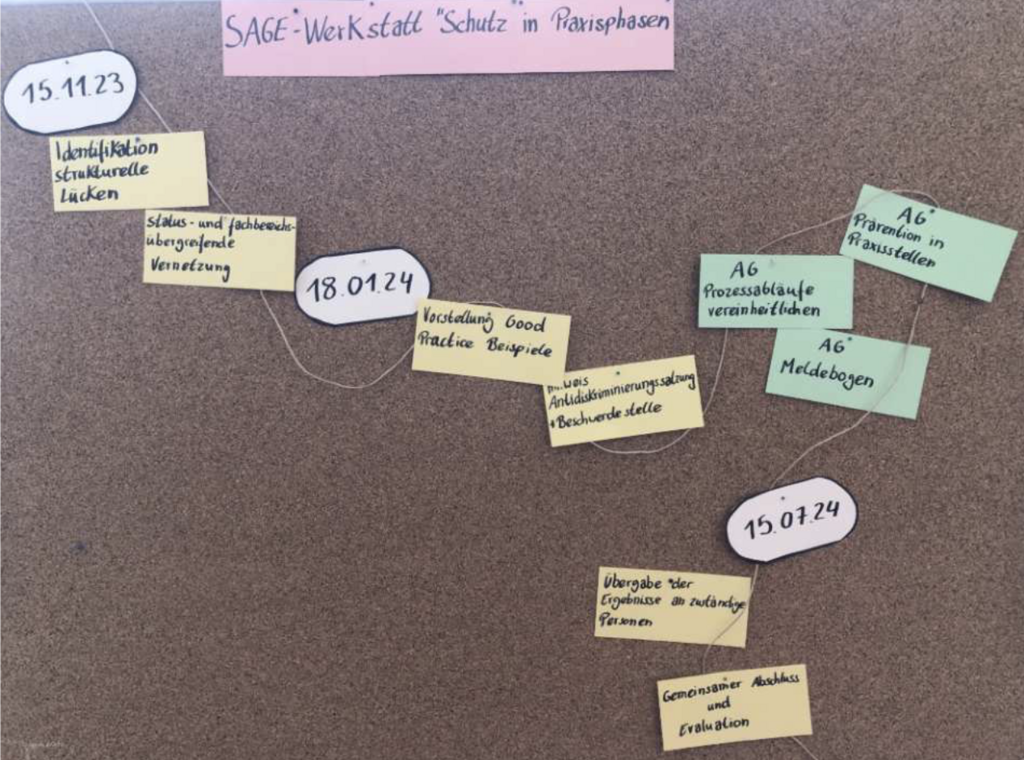In the winter semester 23/24 and summer semester 24, a total of three workshop discussions were held on the topic of "Protection during practical phases". The aims and objectives of the workshop discussions were to network all relevant stakeholders in order to jointly identify challenges relating to protection during practical phases, facilitate an exchange of experiences and jointly develop binding structural solutions to close these gaps.
The starting point was the identification of protection gaps with regard to various forms of discrimination as part of the Sage SAGE! professorship by Prof. Dr. Nivedita Prasad, who has since documented 17 such gaps. One of these concerns the protection of students in practical phases against discrimination (e.g. behavior with sexual connotations), lack of guidance or non-compliance with occupational health and safety measures. The discriminatory incidents include discriminatory incidents against students as well as against clients or colleagues at the internship locations.
Both the internship regulations of all degree programmes and the "Anti-discrimination statutes for protection against discrimination, sexualized discrimination and violence, bullying and stalking" oblige ASH Berlin to ensure that students are also protected against discrimination, violations of employment law and inappropriate behaviour during their internships.
In order to close the identified protection gaps, Prof. Dr. Anja Voss - Vice Rector for Studies, Teaching and Digitalization, Prof. Dr. Nivedita Prasad - holder of the Sage SAGE! Chair for Equality, Diversity and Anti-Discrimination, Peps Gutsche - consultant in the project "Positioned and visible - ASH Berlin's protection concept for dealing with sexualized discrimination and violence and anti-feminist attacks" (InPuT department) and Urte Böhm - consultant for strategy, innovation and quality development in studies and teaching (KomNetz-QSL). Peps Gutsche and Urte Böhm conceptualized, conducted and moderated the workshop discussions. Zola Kappauf, science manager of the Sage SAGE! project, was responsible for the documentation.
Developing studies and teaching together
Responsible persons from both departments, teaching staff and module coordinators from the various degree programs, students, administrative staff from the departments, internship administration and advice, the International Office, the General Student Advisory Service and degree program coordinators were able to come together for the first time in this new "workshop discussions" format, which was specially developed for this topic, in order to further develop studying and teaching as a joint task in line with the Learning and Teaching mission statement. The common goal of improving the practical phases became visible in various thematic exchange rounds across departments, study programs and work areas.
The innovative format should be emphasized: the workshop discussions offered a targeted , moderated space for small group work in a short space of time as well as specialist insights into examples of good practice. A methodical framework and the visualization of the work results made it easier to extract key points. The productive energy of the joint exchange made a valuable contribution to quality development in studying and teaching, to the implementation of the learning and teaching mission statement and to strengthening protection against discrimination at ASH Berlin.
Good practice examples were presented by Prof. Dr. Katja Boguth and Prof. Dr. Claudia Hruska to strengthen the protection of students in practical phases. A reporting form tested in the "Education and Training in Childhood" degree program was further developed during the workshop discussions and is now being tested selectively in the BA in Social Work. The aim is to anchor this form in as many ASH Berlin degree programs as possible. This reporting form is intended to ensure the quality of the practical placements, give students the opportunity to report back critical actions and enable the university to fulfill its duty of care towards students during the practical phases.
In addition, the topic of "protection during practical phases" has become much more present in many areas of the university during the workshop discussions: the International Office offers detailed advice on support for internships abroad. There is a regular exchange on the topic in Faculty 1, and since September 1, the newly established Internship Department has also been supporting the internship administration and social work students. As part of the development of the protection concept for the prevention and intervention of sexualized discrimination and violence, awareness of the topic is raised before the practical phase in the BA Nursing and MA MQG.
In addition, the following joint recommendations to relevant stakeholders were developed by those present: the introduction of the reporting form is recommended, as is the increased visibility of networking and information services. A cross-departmental exchange on the topic should take place once a year and protection in practical phases should be integrated into process and quality management as well as quality management in studies and teaching. It is also recommended that the topic of "protection in practical phases" be implemented as a strategic goal to be operationalized in the departments and that its implementation be regularly monitored.
What happens next?
The next steps are now the implementation and adaptation for the respective degree programs and the implementation of the recommendations outlined in the documentation. The documentation of the workshop discussions can be requested from the Consultant for Strategy, Innovation and Quality Development in Studies and Teaching (KomNetz-QSL), Urte Böhm.



